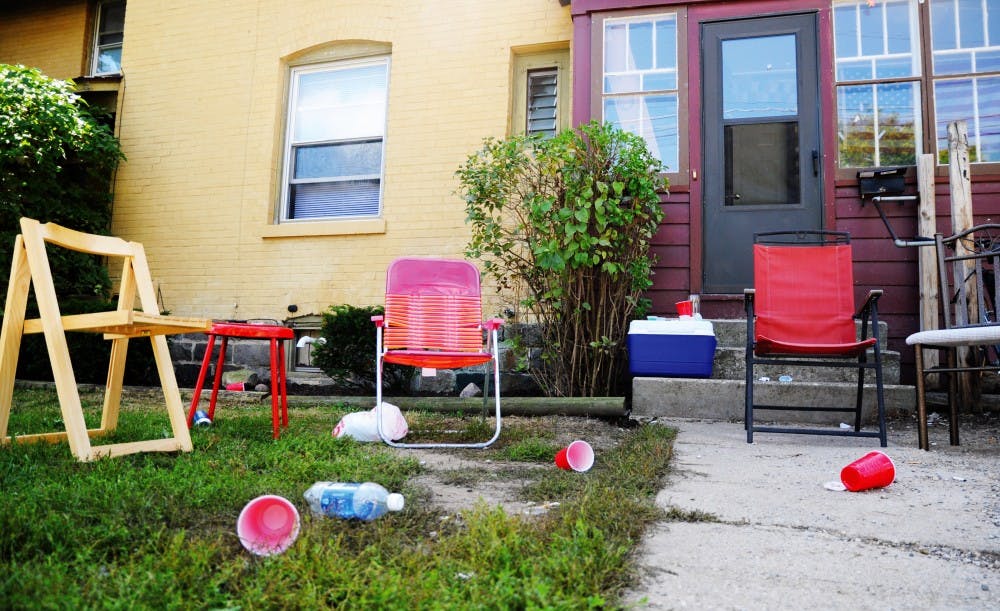The Red Zone: Addressing sexual assaults in the first months of campus life
Addressing sexual assaults in the first months of campus life

From the moment they move into their residence halls, freshmen are statistically more likely to be sexually assaulted.
From Welcome Weekend to Thanksgiving break, they will spend their first semester at Central Michigan University in a period of time known as “The Red Zone.”
“There’s roughly a third of freshman girls who have been sexually assaulted,” said Central Michigan Police Chief Bill Yeagley.
For the first six to eight weeks of the school year, women are more likely to be sexually assaulted, and is harsh reality for many college campuses, Yeagley added.
Number of sexual assaults reported on campus according to Clery Center for Security on Campus reports:
2010: 3
2011: 5
2012: 6
Number of sexual assaults reported in Isabella County according to Michigan Crime Incident Reporting:
2013: 24 (1 to CMUPD, 13 to Sheriff, 6 to State Police, 4 to City)
2012: 47 (3 to CMUPD, 12 to Sheriff, 21 to State Police, 9 to City)
2011: 39 (2 to CMUPD, 11 to Sheriff, 12 to State Police, 12 to City)
2010: 41 (1 to CMUPD, 12 to Sheriff, 9 to State Police, 18 to City)
The first semester of college is a transition for every member of the student body, Yeagley said. The pressure of finding new friends, living in an unfamiliar place and trying to balance a new social life with difficult classes can push new students outside of their comfort zones.
Yeagley said a national survey found nearly 22 percent of those interviewed had reported being sexually assaulted at least once.
According to reports issued by CMUPD to the Clery Center for Security on Campus, three sexual assaults were reported on campus in 2010. That number rose to five in 2011 and six in 2012. The numbers for 2013 have yet to be released.
All college campuses receiving public or state aid must report all alleged and confirmed sexual assaults as part of the Jeanne Clery Act. The Jeanne Clery Act requires these colleges and universities to publicly disclose information about crimes committed on campus.
The Clery Act is enforced by the U.S. Department of Education. All CMU reports are available to the public on the CMUPD website.
Yeagley said the numbers they report through Clery do not include sexual assaults committed city and countywide in Mount Pleasant and Isabella County, where most of the off-campus student housing and activities are.
How to prevent and end sexual assaults is a heated topic of debate among activists, politicians and student groups across America. Finding a solution to the issues is both parts political and cultural, compounding the complexity of sexual assault even further.
However, there are many options locally and on-campus for survivors of sexual assault to get the mental, emotional and physical care they need if an assault does occur.
Steve Thompson, the head of Sexual Aggression Peer Advocates and a national expert on sexual aggression, said SAPA is one of two anonymous resources for students who are survivors of sexual assaults to get help.
“You’ve got to give survivors options,” he said. “Sexual assault investigations are completely different than sexual harassment. If a survivor comes forward and discloses information, (the police) are going to knock on doors.”
Survivors can also visit the Counseling Center in Foust Hall anonymously. Thompson said administrators, hall directors and other university officials and employees have to report the incident to the university.
“If a survivor goes to a Resident Assistant, it has to go up the ladder,” Thompson said.
Tom Idema, director of Student Conduct, said it is important to give these options to survivors.
“Their choices have been taken away from them (after being assaulted,)” Idema said. “We always recommend SAPA. They’re such an important piece to our students.”
Idema added that the presence of various options have helped survivors feel more comfortable reporting assaults. The uptick in reporting has allowed and encouraged more students to go through with investigations of their assaults.
“Ten years ago, we didn’t see that many cases go forward,” he said. “That’s changed in the last five years. Survivors are more likely to go forward. Maybe it’s a changing climate.”
The SAPA call center and the office in Foust Hall 150 get nearly 200-300 survivors and friends of survivors contacting them each year to report assaults.
Thompson, like Idema, said he believes their program has helped many people feel comfortable coming forward, leading to the rise in reports on campus.
“What people don’t realize is high numbers (are) good,” Thompson said. “Low numbers mean survivors and friends are not comfortable coming forward. If we do our job right, the numbers will go up and then level off. Our numbers the last two years have been stable.”
Survivors can call SAPA anonymously at 989-774-2255. They can also call the Counseling Center at 989-774-3381.
They can also report assaults to the Office of Civil Rights and Institutional Equity at 989-774-3253, the Office of Student Conduct at 989-774-1345 or to CMUPD at 989-774-3081.



